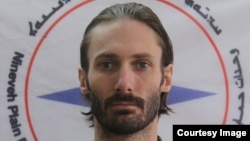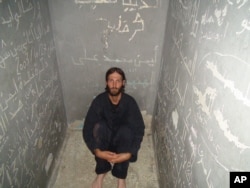Since Islamic State militants declared a "caliphate" last year in parts of Iraq and Syria, thousands of Westerners have traveled there to join the battle.
But one American man told VOA he has joined the fight, not for the Islamic State jihadist group, but against it.
"I am in Iraq helping to raise a Christian army to fight ISIS," declared Matthew VanDyke in a statement on Twitter this week.
VanDyke is a bearded, blue-eyed Baltimore native with a slender build and a master's degree in security studies from Georgetown University. He has formed what he calls the Sons of Liberty International, or SOLI, a nonprofit group that is helping to train a militia made up of Assyrian Christians, whose homeland in northern Iraq has come under attack by Islamic State militants.
The militia, the Ninevah Plains Protection Units, or NPU, is one of several small groups of Christian fighters trying to defend vulnerable locals against the Islamic State group, which has carried out mass executions and expulsions of religious minorities.
Without help, Christians will be 'wiped out'
The jihadi onslaught against the ancient Iraqi Christian community is part of what prompted VanDyke to go to Iraq in early December and join the fight against the Islamic State group.
"They've suffered greatly under ISIS," VanDyke told VOA via Skype from the northern Iraqi town of Irbil. "There's tens of thousands of Christian refugees and the population of Christians in Iraq is severely threatened."
VOA was not able to confirm VanDyke's location.
"A lot of them have left and have become refugees and will not return to their homes. And if the Christians cannot demonstrate that they're able to secure their own lands, Christianity will be wiped out," he said.
According to VanDyke, the best way to stop the onslaught is to equip locals to protect themselves. To do that, he is recruiting U.S. combat veterans to come to offer specialized training to the Assyrian fighters.
So far, Vandyke said five military vets have volunteered to help train the NPU.
"And it's going quite well," VanDyke said. "We ran a covert training camp north of Mosul for about a month."
"The results were very positive. I have observed the Iraqi army and the Afghan army in the past, and these fighters far surpassed them in their motivation and morale and talents and how quickly they learned and how seriously they take things," he said.
Kaldo Ramzi, an official with the NPU, confirmed to VOA that VanDyke and the Sons of Liberty International have helped provide basic training to about 500 fighters that make up the Assyrian militia.
Ramzi said for now, the NPU was focused on protecting lands not yet taken by the Islamic State militants. But once the group receives more training, funding, weapons and fighters, he said it planned go on the offensive to retake Assyrian towns captured by the extremists.
Not part of US government efforts in Iraq
VanDyke and Ramzi even claimed to have met with U.S. State Department officials at a consulate in Iraq, who, they said, have given the NPU and its coordination with SOLI their full verbal support.
When contacted by VOA, a State Department official refused to confirm such a meeting.
"American civilians who may have traveled to Iraq to take part in military activities are not part of the United States government effort in Iraq," the official said.
"As our travel warning indicates, we have been clear that travel to Iraq remains very dangerous and that we do not endorse nonessential travel to Iraq by private U.S. citizens," the official added.
The NPU is trying to coordinate its efforts with at least some other local groups, including the Kurdish Peshmerga fighting force that is also battling Islamic State militants. Some of the NPU training camps have been held at Peshmerga bases, for instance, according to VanDyke and Ramzi.
But while the Peshmerga, backed by U.S.-led airstrikes, has had some success in retaking Kurdish areas from the Islamic State group, the paramilitary group has been hesitant to expand its efforts to other non-Kurdish territory captured by the Islamists, leaving many Assyrians desperate for help.
"For over six months, neither the Kurds nor the U.S. have lifted a finger to liberate towns, like [the Assyrian city of] Qaraqosh, which are a 10 minute drive from Kurdish front lines," said Michael Knights, an Iraq security specialist at the Washington Institute for Near East Policy.
Other small groups of sectarian fighters are also interested only in defending their own territory, leaving no single unified anti-Islamic State fighting force and making the conflict a necessarily sectarian battle.
Western volunteers 'not needed or useful'
But there are concerns about whether forming explicitly Christian armies, and involving foreign volunteers in that effort, will bolster the appeal of the Islamic State group, which already claims to be fighting a holy war and battling what it sees as Western crusaders.
Knights, though, wasn't convinced this would increase the ferocity or change the nature of the conflict.
"ISIL is sure as hell fighting a holy war against them. They won't be put off by any U.S. volunteers who are using the same language in return," he said. "We are already at a medieval barbarity stage and ISIL did that on their own."
Others are more skeptical of the efforts of volunteers such as VanDyke.
"I don't think his help or others is needed or useful," sid Sajad Jiyad, an Iraq analyst with the Baghdad-based Iraqi Institute for Economic Reform. "The NPU has Iraqi federal government support, so American advisers are already playing a role in training.
"It definitely adds to the propaganda daesh can use and there are enough foreigners already in Iraq," continued Jiyad, using an Arabic word for the Islamic State group.
'Not fighting a Holy war'
But VanDyke insisted he didn't have time to argue over semantics.
"Do we really care what ISIS' talking points are anymore? That's a luxury enjoyed by people in the Western world who aren't being beheaded or burned alive, to be worrying about whether it reinforces ISIS' talking points," he said.
But despite sometimes using stark, sectarian language to define the conflict, VanDyke stressed he didn't see himself as a modern day crusader.
"It's not a religious war and certainly not a crusade or anything like it," he said. "The Assyrian Christians have lived in peace with their neighbors and they will continue to. They are interested in defending their own lands against ISIS and any other terrorist threats and that's it."
Kidnapping 'always a risk'
VanDyke said the Assyrian Christians were "eager to get out and defend their homeland." But he wouldn't say whether the group has actually begun taking the fight to the Islamic State group. He also wouldn't make any promises that he would stay off the front lines himself.
VanDyke does have experience with Arab militias. His 2011 involvement with Libyan revolutionaries in the uprising against Moammar Gadhafi was the subject of an award winning documentary called "Point and Shoot."
But for now, VanDyke said he's "way too busy" managing his Sons of Liberty organization to take on any combat role.
"This is really a full-time-plus job. It involves a lot of moving pieces and is quite a challenge, but a rewarding challenge and something I love doing. But there's certainly been no time for me being on any front lines fighting," he said.
When asked whether he feared being killed or kidnapped by the Islamic State group, as other foreigners have been, VanDyke said that's a chance he's willing to take.
"It's always a risk in this work. It's something I take precautions against, but it's not going to stop me from doing this work. It's something I believe in," he said.
Pam Dockins contributed to this story from the State Department.





